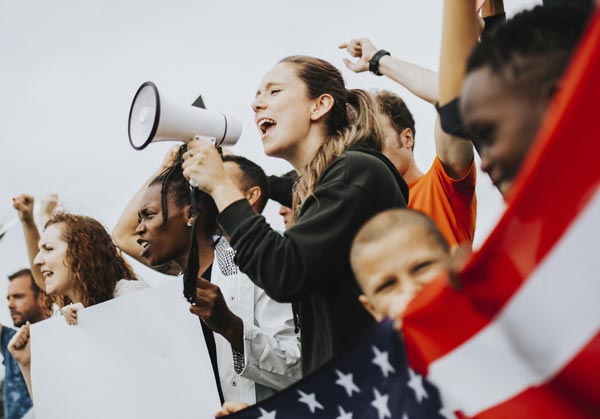If your first reaction to hearing calls to “defund the police” is “no way” or “that’s absurd,” you’re not alone. You might have questions like, “don’t we need the police?” or“if we defund the police, who do we call when there’s a crime?”
The idea of defunding the police can be a scary prospect, but at the heart of this idea is an opportunity to reimagine what kind of society we want and deserve. What would society look like if we held it to a higher standard? What would society look like if we truly value human life? What would society look like if we expect and, indeed, demand non-violence, not only from resistance movements, but also from the state, law enforcement, and the justice system?

Understanding the root of the grievances that spurned calls to defund the police starts with understanding what’s happening in law enforcement and the prison systems today, why they’re not working, and the data that support that claim.
What Does It Mean to “Defund the Police”?
That’s a complicated question with multifaceted answers. Some might view “defunding” as simply police reform. Others, completely abolishing law enforcement and the prison system altogether and replacing them with alternative systems.
In truth, it’s neither strictly reform nor complete abolition. Instead, “defunding the police” means developing a strategy for redistributing state budgets (taxpayer money) in a way that creates a more equitable and fair system.
Quote:
“A Nation should not be judged by how it treats its highest citizens, but it’s lowest ones.” ― Nelson Mandela
What is “Justice Reinvestment”?
Defunding the police (i.e., redistributing state money in a more equitable way) is one part of a larger movement theorized by criminal scholars and supported by marginalized communities known as “justice reinvestment.”
The Bureau of Justice Assistance (BJA) at the US Department of Justice (DOJ)’s website describes justice reinvestment as: “A data-driven approach to improve public safety, examine corrections and related criminal justice spending, manage and allocate criminal justice populations in a more cost-effective manner, and reinvest savings in strategies that can hold offenders accountable, decrease crime, and strengthen neighborhoods.”
The movement believes in collecting and analyzing data on why crime happens, proposing and implementing changes to increase public efficiency, and measuring the financial and public safety implications of those changes. It argues that taxpayer money could be reallocated to better serve all of our fellow Americans.
How Did This Movement Arise?
Over several decades of research and study, criminologists have found weak relationships between the things we’ve been doing to curb crime – spending more money on law enforcement, imprisoning more people, and increasing the severity of punishments – and the impact on actual crime.
Marginalized communities experience this firsthand, and criminologists back up their lived experience with hard data.Despite our efforts to support law enforcement with more and more funding and crack down on crime with harsher punishments, crime still happens at largely the same rate. Moreover, these outsized investments and harsher punishments unfairly impact marginalized communities in ways that far exceed their crime rates.
Over the past 50 years, public institutions like housing, health care, and education have been steadily defunded by budget cuts. In that same time, law enforcement budgets have remained the same or enlarged, sometimes by nearly 30 percent.
This simultaneous defunding of public institutions that help build stable communities and increased funding for public institutions that punish unstable communities led to calls for a rethinking of how we spend our money – calls to defund the police.
What Does Defunding the Police Look Like?
Defunding the police means cutting money from overinflated police budgets and reinvesting that money into programs that help communities thrive – non-police forms of public safety like mental health services, housing, education, and other community programs.
Even some police departments can attest to the outsized reliance our communities place on police. Former Dallas Police Chief David Brown stated in 2016, “We’re asking cops to do too much in this country. Every societal failure, we put it off on the cops to solve. Not enough mental health funding, let the cops handle it. … Here in Dallas we got a loose dog problem; let’s have the cops chase loose dogs. Schools fail, let’s give it to the cops. … That’s too much to ask. Policing was never meant to solve all those problems.”
Defunding the police simply means removing tasks (and attendant funding) from law enforcement’s plate and reallocating them to better serve the American people. It may sound radical, but cities and states reallocate budgets every year.
What You Can Do
The Fair Fight Initiative advocates for a fair and equitable criminal justice system. With the support of donations, the Fair Fight Initiative provides support for victims and their families to bring litigation to all forms of criminal injustice, especially for those mistreated by law enforcement. The Fair Fight Initiative also uses advocacy to bring awareness to these injustices.
A donation to the Fair Fight Initiative helps us fight to create a justice system that is fair for all.
Please submit an application if you feel you or a loved one has been the victim of mistreatment or inhumane conditions in the legal system. Accepted cases will be supported with fundraising, reducing or eliminating costs to you. Fair Fight Initiative receives many applications, and responses may take many weeks.
